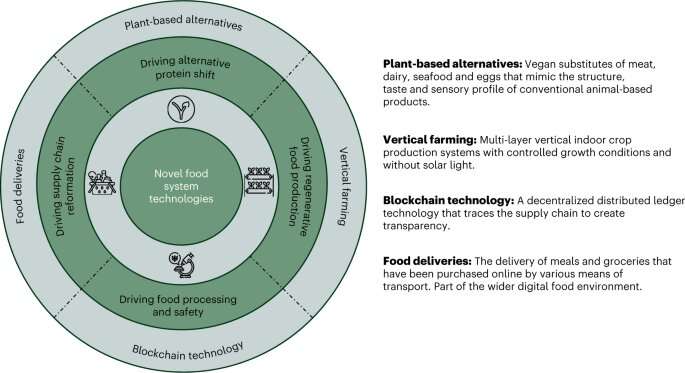Sustainability claims behind booming food technologies lack evidence, study finds

A new analysis reveals significant gaps in evidence related to the sustainability claims of new food technologies such as vertical farming, blockchain, food deliveries and plant-based alternatives to animal products.
Money is pouring into food tech. But despite rosy claims, food innovations are rarely empirically assessed from a broader sustainability perspective.
"Food system technologies are often surrounded by a sustainability halo. And many of them strive to reduce climate impact, but they disregard other dimensions of sustainability," says Anne Charlotte Bunge, researcher at the Stockholm Resilience Centre at Stockholm University and lead author of a recent study published in Nature Food.
In the study, the research team compared the scientific evidence behind sustainability claims of four food system technologies: plant-based substitutes for meat, dairy, eggs or sea food; vertical farming; food deliveries; and blockchain technology. All four receive considerable interest from venture capital firms across Scandinavia, and all are frequently framed as new sustainable solutions. However, the scientific evidence to back these claims up is limited, according to the new study.
For blockchain technology, no research has shown any tangible sustainability improvements related to its usage in the food industry. Studies that have been published so far only discussed theoretical benefits.
Plant-based substitutes are found to have lower environmental impacts than conventional animal-based products. But research on their nutritional aspects has not been studied over the long term, and other socioeconomic factors, such as pricing, are rarely discussed.
"Plant-based alternatives are higher in costs than conventional animal products, which could generate the impression that a plant-based diet is more expensive and seen as a luxury, leading to social inequalities," warns lead author Anne Charlotte Bunge.
Vertical farming has a mixed sustainability performance. Vertical farms outperform on-field cultivation and greenhouses in some aspects, such as land and water use. However, they often require more energy and emit more greenhouse gases than field agriculture. And regarding other aspects of sustainability, there is little research: "We found a distinct lack of evidence modeling the socioeconomic implications of scaling vertical farming," says Anne Charlotte Bunge.
Food deliveries performed worse in most aspects of sustainability, except that delivered groceries are better than making individual trips to the supermarket by car—but not by foot or public transport. Having meals delivered to one's home did not have any benefits, according to the analysis.
"Research demonstrates that walking to the restaurant and consuming the meal there instead of having it delivered could reduce the total amount of greenhouse gas emissions by 68% per meal," says Anne Charlotte Bunge.
Even here, significant gaps in research exist on other environmental issues and social sustainability. To prevent misled investments in the future, the researchers call for a new sustainability assessment framework.
"Guiding transformative investments requires a more rigorous, quantitative assessment of the sustainability implications of food system technologies," says co-author Line Gordon, professor at the Stockholm Resilience Centre at Stockholm University.
What are the four food technologies?
- Plant-based alternatives: Vegan substitutes of meat, dairy, seafood, and eggs, that mimic the structure, taste, and sensory profile of conventional animal-based products.
- Vertical farming: Multi-layer vertical indoor crop production systems with controlled growth conditions and without solar light.
- Blockchain technology: A decentralized distributed ledger technology that traces the supply chain to create transparency.
- Food deliveries: The delivery of meals and groceries that have been purchased online by various means of transport. Part of the wider digital food environment.
More information: Anne Bunge, A systematic scoping review of the sustainability of vertical farming, plant-based alternatives, food delivery services and blockchain in food systems, Nature Food (2022). DOI: 10.1038/s43016-022-00622-8. www.nature.com/articles/s43016-022-00622-8
Journal information: Nature Food
Provided by Stockholm University





















